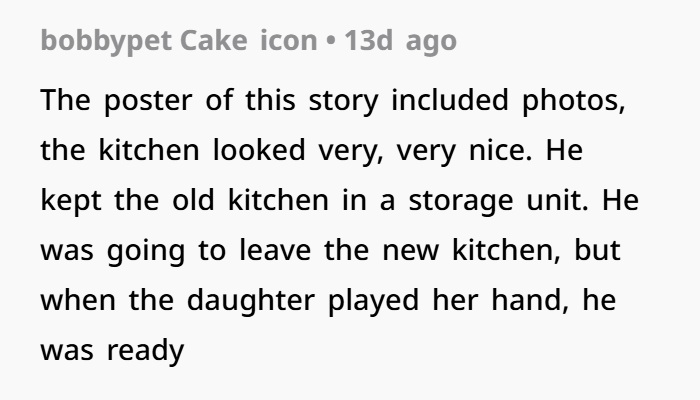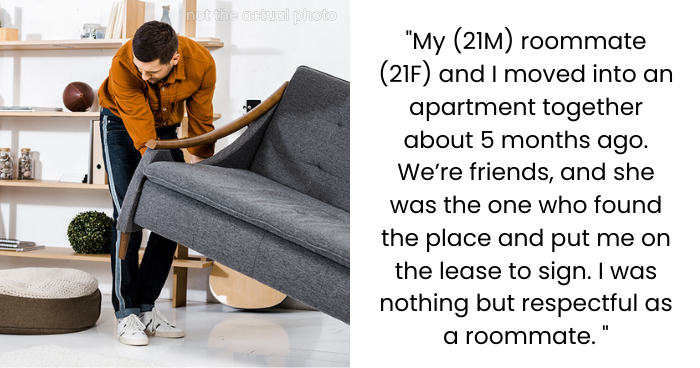AITA for Taking My Belongings When Asked to Move Out by My Roommate?
When a young man came home to find that his roommate had unexpectedly asked him to vacate their apartment, he took stock of the situation and did what anyone would do — take everything he ever bought for the apartment. It was his roommate who had broached the subject, with plans to dissolve their living situation. While that took him by surprise, he honored her request and scrambled to find a new place — but blood was spilled in that move as well when he left her a near vacant apartment. He was never going to go to dinner, but that was a perfectly reasonable decision in his mind; yet a few mutual friends felt that it was a jerk move.
This thread brings up some important issues about housemates, what it means to be friends, and what happens to cohabitation arrangements when they come to an end. It also highlights the difficulties of owning personal property while engaging with people up close and personal in these settings.
A bit of friction is to be expected when living with other people. What’s unpleasantly surprising is when they don’t communicate at all

An anonymous man explained how his friend, whom he was living with, suddenly demanded that he move out
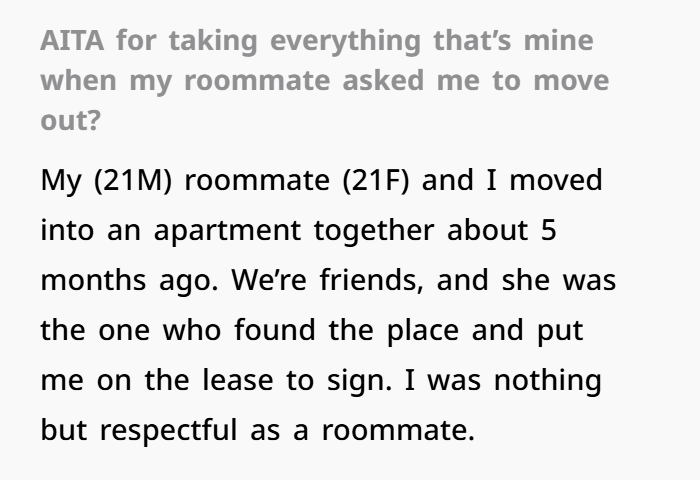
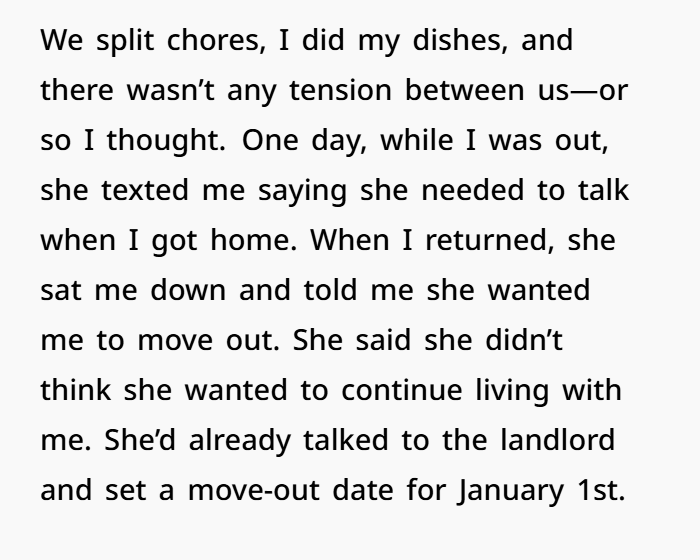
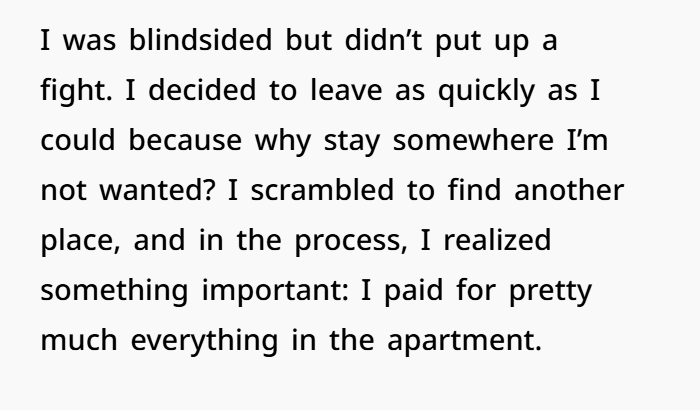
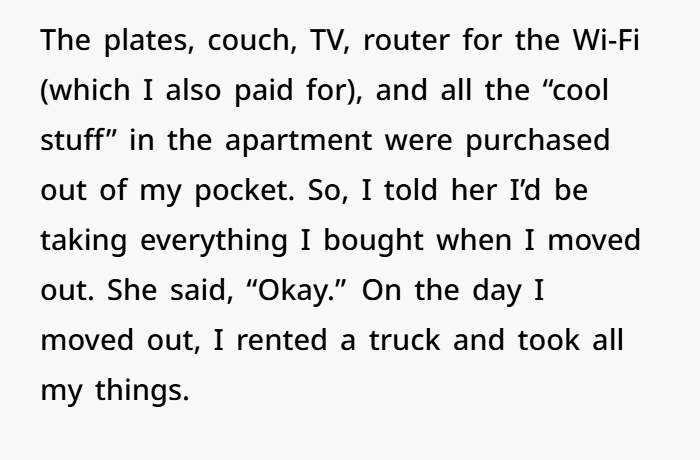
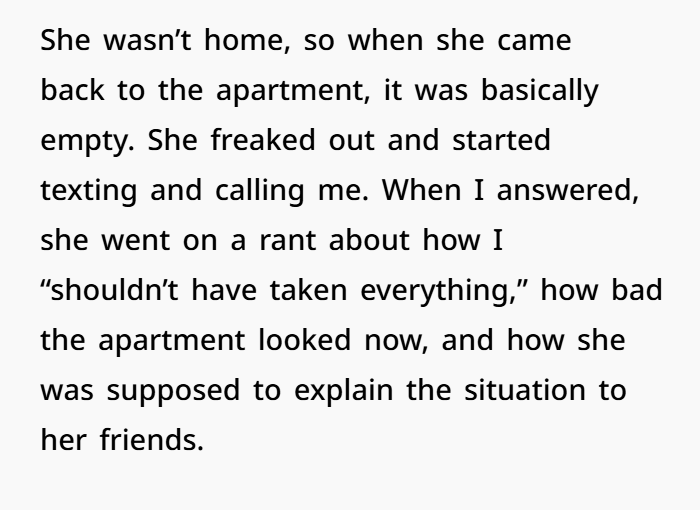

Understanding Property Ownership in Shared Living Arrangements
When you live with others, property rights disputes are pretty common, especially when each other’s expenses have not been properly discussed. This could include owning or renting a home, and experts on cohabitation agreements, like the ones at Nolo Legal Encyclopedia, recommend that you have a written understanding of who owns what once you move into a shared space. This assists in ensuring that things are clear if one of the parties needs to kick out to the left for whatever reason. The poster had every right to take back items that he had purchased outright and when there was nothing presented to suggest a shared ownership.
The Social Dynamics of Roommate Conflicts
The nature of roommate relationships is a confusing cross between friendship and just living together. Research released in the Journal of Social and Personal Relationships, reveals that conflict stems from one party sensing inequity between the two. In such a case, the way the roommate suddenly cut the deal without any kind of previous mediation increased the sensation of intimidation and (loss of) emotional attention, leading the poster to bulk pick out every little thing that’s in his rooms neglecting the have an effect on and consequence on his roommate.
Legal and Ethical Considerations

Legally, it makes sense the poster was within his rights, he just took what he paid for. In the U.S, the Uniform Commercial Code acknowledges one simple truth: that unless ownership has been documented to have passed from the buyer to another party, personal property belongs to whomever paid for it. But ethically, some would consider leaving the apartment in such a state nearly unlivable too much. He did leave behind a mini-fridge, but his roommate most likely had a hard time with the couch and Wi-Fi router he only used to remain living in the apartment.
Navigating Mutual Friends and Social Perception
The complication adds a further dimension in the form of the fallout with mutual friends. In shared living situations, the social implications of doing something can extend past the immediate relationship. The Psychology Today article on resolving conflicts also points out that civilization is built on empathy to communicate in a way that allows social peace. The poster is technically correct that he did what he said he would do but talking about a middle ground, maybe just take the essentials and leave it on the ground would have probably avoided a lot of fallout from friends.
Lessons for Future Cohabitation Arrangements
- Document Agreements: Clearly outline responsibilities and ownership of shared items before moving in together. This prevents disputes in the event of a sudden separation.
- Communicate Expectations: Ensure both parties agree on how to handle shared property during a move-out scenario.
- Consider Social Implications: While ownership rights are important, balancing them with empathy can preserve relationships and prevent fallout.
Many internet users who stumbled across the story wanted to share their perspectives. Here’s what they told the author

